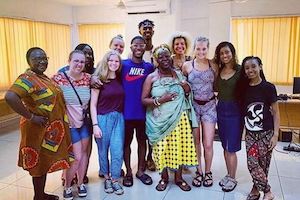(Thailand)
 |
(Ghana) |
Race + Ethnicity
For all students, study abroad can be an incredibly enriching experience, but it can also pose specific challenges. We believe there is inherent value in studying abroad for all students and want to provide resources to assist you. Thinking about the issues below may help you better prepare for experiences you may encounter.
Things to consider
When considering programs, you may have a lot of questions! Here are some others to think about and research:
- What racial and ethnic groups do I identify with and how will those be perceived in my host country?
- What are the dominant racial and ethnic groups in my host country? Will I be in the majority or minority?
- Will I be treated differently because of my racial and ethnic identities?
- How diverse is the host city, host university, etc?
- Do you want to study in a location that has significant heritage or family connections?
- How do the academics in a certain country relate to your academic and/or personal goals?
Racism is a global phenomenon
| Local residents don't believe you're "American" because you don't match their perception of an "American" |
"No, where are you really from..." not believing you at from the United States. |
| People may touch your hair or skin without your consent |
People may take photos of you, with or without your consent |
| Staring/Gawking |
What we perceive as racial slurs may be used in everyday conversation. Example: referring to someone as a “negrita/negrito” in some Latin American countries is common and sometimes even a term of affection. |
| You may be asked to speak for all people in your racial/ethnic group in the U.S. (typically experienced by BIPOC students) or all Americans (typically experienced by White students) |
Ask if you know (insert famous person of color) |
All those and more are experiences students could encounter when studying abroad. While racism doesn't typically define the whole study abroad experience for students of color, racist statements or gestures are always painful and difficult to experience. Traveling the world will introduce you to many people and you may encounter or witness forms of racism from peers on your program, local students/residents and international students/travelers.
You may find that the emphasis placed on your race & ethnicity varies depending on the context you are in:
Visually, you may appear to be in the racial or ethnic majority for the first time
- You may notice billboards, advertisements, media visually represent you
- You don't stand out based on your skin color
- Locals speak to you in local language based on appearances that you'd speak the language
|
OR |
Visually, you may appear to be in the racial or ethnic minority for the first time
- Your skin color makes you stand out
- You may notice staring or gawking
- Locals don't use the local language with you, even if you are trying to speak it
|
You may be labeled as "American" no longer "African American," "Asian American, "Hmong American" etc. This might not be an identity you consider in the U.S.
- Many countries don't have labels like "African Australian", "Asian Costa Rican", etc. The U.S. is one of very few places that adds labels to some groups.
|
OR |
You may not fit the broad stereotype of what your host country thinks "African American, "Asian American" etc. is.
- Example: people may assume you love hip hop, when maybe you never listen to it.
|
| You may experience less racism |
OR |
You may experience racism for the first time or new forms of racism |
| You may be able to find a plentiful array of ethnic food/clothing/personal hygiene items that you can't find in Eau Claire? |
OR |
You may find it harder to purchase products and foods you normally do in Eau Claire |
Resources to Get you Started:
Black or African American
|
Asian or Asian American
|
Latinx or Hispanic
|
Indigenous or Native American
|
Middle Eastern or Arab American or Muslim American
|
White or Caucasian
|
A special thank you to GoAbroad.com for providing resource guides to Northwestern University for useful tips and the University of Minnesota's Learning Abroad Center for some videos.
DACA student resources
USCIS announced in September 2017 that it would no longer accept advance parole applications, meaning that DACA students could currently not study abroad. Even when advance parole applications were being accepted/approved, they did not guarantee reentry to the US. As a result of the June 2020 SCOTUS decision, the Department of Homeland Security will need to establish rules and procedures to process advanced parole again, however, no one can apply for this until procedures are in place (which as of June 2020, they weren't). Therefore, even if USCIS does begin processing advance parole again, we’d strongly recommend that you consult with an immigration attorney before deciding to pursue study abroad. If you iare considering a major or minor that requires time abroad (i.e. Spanish), contact your academic advisor in the department to discuss potential domestic options.
More information can be found on the largest, international education organization,
NAFSA's DACA Resource Page, which is updated as new developments come forward.
